Adverse Possession: Understanding the Controversial Concept in Property Law
Property law is a fascinating and complex field that governs the rights and responsibilities of individuals in relation to land and the structures built on it. One particularly controversial concept in property law is adverse possession, which involves the acquisition of someone else’s land through continuous and open possession for a specified period of time. In this article, we will delve into the intricacies of adverse possession, explore its legal foundations, and discuss its implications.
The Legal Basis of Adverse Possession
Adverse possession is a doctrine that has roots in common law and aims to strike a balance between the interests of property owners and those who have occupied the land for an extended period of time. The doctrine provides a pathway for individuals to acquire legal ownership of land by satisfying specific criteria, typically including:
- Actual and exclusive possession of the land
- Open and notorious use of the land
- Continuous possession for a certain duration
- Hostile possession without the owner’s permission
The duration required for adverse possession varies depending on the jurisdiction, but it is typically between 10 to 20 years. During this time, the adverse possessor must maintain their physical presence on the land, treat it as if they are the true owner, and exclude others from entering or using it.
The Controversies Surrounding Adverse Possession
Adverse possession is a highly controversial concept that raises ethical, moral, and practical concerns. Critics argue that it allows individuals to profit from the deprivation of property rights of others, potentially rewarding trespassers and squatters. They argue that adverse possession conflicts with the principles of fairness and respect for property rights.
Proponents of adverse possession, on the other hand, highlight its importance in resolving land disputes, preventing uncertainty, and incentivizing the productive use of land. They argue that the doctrine serves as a mechanism for promoting social and economic stability by rewarding those who have invested time and labor in neglected land.
The Implications of Adverse Possession
The implications of adverse possession are far-reaching and affect both property owners and adverse possessors. For property owners, adverse possession poses a potential threat to their ownership rights. If they fail to take legal action within the specified statutory period, they may lose their property to the adverse possessor. This highlights the importance of regular property inspections and diligent monitoring of land use.
Adverse possessors, on the other hand, may face challenges in establishing and defending their legal claims. They must satisfy all the necessary elements, including demonstrating the requisite period of possession and proving their use of the land was open, continuous, and hostile. Understanding the legal requirements and consulting with a property law expert is crucial for adverse possessors seeking to secure legal ownership.
Conclusion
Adverse possession remains a contentious issue in property law, with competing interests and conflicting viewpoints. Understanding the legal foundations, controversies, and implications of adverse possession is essential for both property owners and adverse possessors. While some welcome adverse possession as a means to resolve disputes and incentivize land use, others argue that it undermines property rights and rewards those who encroach on the rights of others. As property law continues to evolve, it is important to stay updated on the latest legal developments and consult with experts for guidance.
Do you want to test your knowledge of contract law? Check out our related article on Interactive SQE Mock Tests for Contract Law: Test Your Knowledge.
To learn more about recent changes in contract law, read our comprehensive analysis of Contract Law Reforms: An Analysis of Recent Changes.
Understanding the rights and responsibilities of parties in a contract is crucial. Explore our guide on Parties in a Contract: Rights and Responsibilities to gain valuable insights.
Ethics play a vital role in contract law. For a comprehensive guide on the importance of ethics in contract law, visit our article on The Importance of Ethics in Contract Law: A Comprehensive Guide.
Curious about duress and undue influence in contracts? Unveil the intricacies of these concepts in our article on Unveiling Duress and Undue Influence in Contracts.
